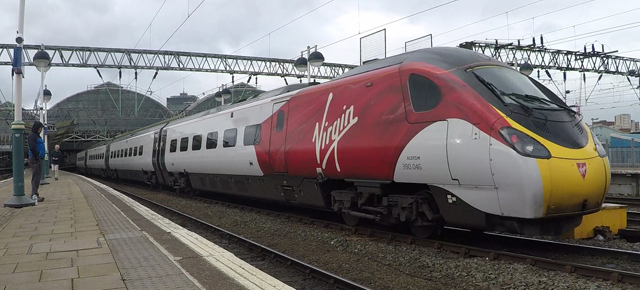Former Virgin executive Will Whitehorn tells Lunch with Leon podcast why he believes that Britain’s railway is ‘back in a mode of managed decline’

Will Whitehorn, a close colleague of Sir Richard Branson throughout the nineties and much of the noughties, has warned that Britain’s railway will suffer from managed decline and a lack of innovation under public control.
Whitehorn served as an official spokesman for Branson as his Virgin Group sought to transform intercity rail services on the West Coast Main Line, and he says that the group can take credit for passenger numbers on the route rising from 12 million to 40 million a year under its stewardship.
Speaking to Leon Daniels for the Lunch with Leon podcast, which is produced in association with Passenger Transport, Whitehorn said: “It’s a bit of a tragedy that it’s all been re-nationalised – which it already has – because there is no innovation and it seems to me to be back in a mode of managed decline.”
Whitehorn says there is no doubt that Virgin’s tenure of the West Coast route was a success, but rail franchise contracts failed to respond to major societal changes, such as an increase in working from home, which became even more widespread in the aftermath of the pandemic.
“The franchise contracts the government had with train operators were not flexible enough, so they almost all went into losses even before covid had happened,” he said. “But the immediate instincts of – I’m afraid I’m going to be a little bit rude – transportation civil servants and ministers on both sides of the house, and MPs, has been the solution to this is basically take it all back under state control.”
Whitehorn believes this is a backward step for the railway and he believes that this is already being demonstrated in Scotland, where the SNP-led Scottish Government has taken the ScotRail franchise in-house.
“There is no improvement whatsoever [in Scotland],” he said. “There is again decline. There has been a cut in the number of services. They are later and they are not working as well.”
He continued: “The railways were going somewhere quite good for a while and they have slipped back … Why are we bothering to have a regulator anymore in the railways? They are all government contracts. They are regulating themselves. All of these things I am finding ridiculous.”
The railways were going somewhere quite good for a while and they have slipped back
Whitehorn also criticised the government for wasting money on an HS2 scheme it will never complete instead of backing a cheaper alternative. He recalls how Virgin proposed investing in a “reasonably fast line” from London to Birmingham to offer extra capacity and a new fleet of 140-160mph “Super Pendolinos”. He claims that this would have sped up journeys between London and the North and increased capacity for a fraction of the cost.
“We went to see ministers. We said you cannot build what you are trying to build. It will never happen,” recalled Whitehorn.
“It beggars belief to me … I am absolutely convinced there were quite a lot of people who were still in the mindset, ministerially and in the civil service, who had less experience of operating a transport business, that it was a kind of ‘Grand Projets’ – we must be the fastest railway. You could tell there was that mindset going on.”
After working on planes and trains with Virgin, Whitehorn went on to serve six years as president of Virgin Galactic. He believes that the space sector, together with AI (artificial intelligence) will lead technological advances in the years ahead.
“I am chair of a company called Seraphim Space Investment Trust,” he said. “We’ve invested ourselves alone in 28 new space companies over the past few years, many of whom are now becoming major players in the industry of supplying information and data from space that is essential for everything around us to work, from the production of food to insuring, shipping, you name it you are going to find space in the middle of it. And, AI alongside, that’s where the revolution is really going to take off.”
He believes that existing space technology could already have a transformational impact on rail. he explained: “The big change that is going to come even in the UK in rolling stock and railways, if we had the willpower to introduce the technology that already works, is to manage the train separations with moving block signalling but using space satellites now as well. And that would make the capacity no problem on the UK rail network.”
Listen to the full interview: leondaniels.co.uk/podcast
This article appears in the latest issue of Passenger Transport.
DON’T MISS OUT – GET YOUR COPY! – click here to subscribe!








